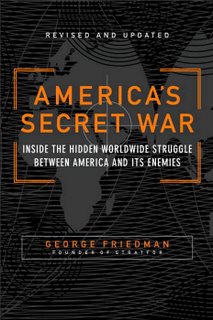Making sense of another worldwide conflict
 Nowadays, the problem of trying to understand the United States and its politics, policies or strategies is not the scarcity of information but the excess of it. The problem is compounded by the outpour, after 9/11, of too many very nicely packaged books of dubious intellectual quality expounding all kinds of conspiracy theories, especially on the 'war against terror' from Afghanistan to Iraq.
Nowadays, the problem of trying to understand the United States and its politics, policies or strategies is not the scarcity of information but the excess of it. The problem is compounded by the outpour, after 9/11, of too many very nicely packaged books of dubious intellectual quality expounding all kinds of conspiracy theories, especially on the 'war against terror' from Afghanistan to Iraq.Fortunately and happily, George Friedman has written an exceptional one on the strategic, operational and tactical thinkings of both the United States and its latest enemies in the forms of Osama bin Laden's Al Qaeda, Taliban's Afghanistan and Saddam Hussein's Iraq, in their worldwide struggle.
America's Secret War - Inside The Hidden Worldwide Struggle Between The United States And Its Emenies (London, Little Brown, 2004) builds a broad, coherent, rational and big picture of whay Friedman calls "the Fourth World War" that began on 11 September, 2001. This book was once named on the recommended reading list prepared by the Council of Foreign Relations.
It makes the assumption that in spite of popular impression, both President Bush and his enemies like Osama bin Laden are " rational - if not necessarily moral or decent - actors" who "have shaped the world". According to Friedman, " while America's leaders might be knaves, they are not fools" and " while our enemies might have utterly different moral values that are repungnant to us, they are far from insane".
It is indeed a good book that can help us to connect the dots into lines and build a picture of what has been happening in the world since 11 September, 2001.


<< Home